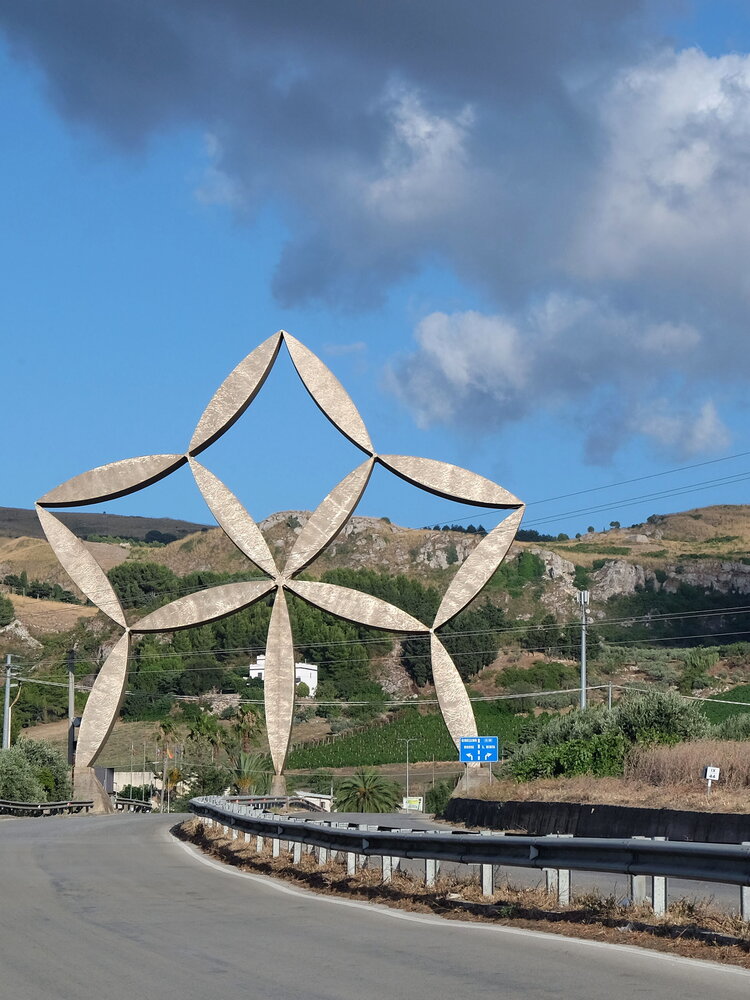Gibellina is the Italian Capital of Contemporary Art 2026. It was proclaimed today 31 October by the Minister of Culture,Alessandro Giuli,during the ceremony which took place in Rome, in the Spadolini Room of the ministry, which was attended by the Director General of Contemporary Creativity,Angelo Piero Cappello and the President of the Jury,Patrizia Sandretto Re Rebaudengo.
The ceremony took place in the presence of representatives of the five finalist cities: Carrara, Gallarate, Gibellina, Pescara and Todi.
Resurrected from the catastrophic Belice earthquake of 1968, Gibellina continued to bear its scars, but art itself was the key to a restart. The president of the Sicilian Region, Renato Schifani, rejoices: “This recognition celebrates a city that is a symbol of cultural and architectural rebirth, a place that, since the tragedy of the earthquake, has been able to rise again as an international point of reference for contemporary art and creative innovation The choice of the Trapani town underlines not only the historical and cultural importance of this Sicilian municipality, but also the incredible contribution of our region to the national artistic panorama”.
#Gibellina (TP) is one of the 5 finalist cities for the “Italian Capital of Contemporary Art 2026” with the project “Bring me the future”.
▶️ Find out more at: https://t.co/ce9vWnzfM6 pic.twitter.com/1QJx829lJy
— Ministry of Culture (@MiC_Italia)
October 28, 2024
The choice of the Ministry of Culture, continues Schifani, “represents an extraordinary opportunity to support new projects and to further grow the artistic and cultural identity of the Municipality. As has already happened with Agrigento, which will be the Italian capital next year of Culture, we will work to ensure that Gibellina, beyond the state contribution, can count on further financial resources that give impetus to initiatives that enhance the territory and promote contemporary art in all its forms. This is a success for the whole Sicily, which confirms its position as a land of culture and creativity”.
After Agrigento, Italian Capital of Culture, Sicily therefore obtains another prestigious recognition. “A tangible sign of the extraordinary cultural richness of the island, which represents an open-air treasure chest where ethnic groups and traditions merge and coexist in an unrepeatable uniqueness”, for the councilor for cultural heritage, Francesco Paolo Scarpinato. For Gibellina the designation has the flavor of redemption.
On the night between 14 and 15 January 1968, the Belice Valley earthquake destroyed it. The town was razed to the ground and around 150 people died. The town was entirely rebuilt eighteen kilometers away, creating the largest open air museum in the world. Numerous artists contributed, in fact, to the reconstruction, dotting the landscape with bold sculptures and architecture that can be admired while walking through the streets.
Even the ruins of the earthquake were transformed into a work of art by Alberto Burri who, by covering them with a cast of concrete, made an enormous Cretto. At the Civic Museum of Contemporary Art you can admire the works of the main artists who worked in Gibellina during the reconstruction period: Accardi, Consagra, Rotella, Guttuso, Schifano and Sanfilippo, just to name a few. In the summer period, the Orestiadi festival continues the avant-garde vocation of the place with a review of theatre, poetry, visual arts and music. On the steep side of the mountain on which old Gibellina stood, an enormous blanket of white concrete unfolds, the Cretto by Alberto Burri, an extraordinary work of land art which, like a white shroud, covers the ruins of the city.
Due to its South-South-East location and its vast proportions, it is clearly visible from afar and from the nearby Salaparuta and Poggioreale: the impression it arouses is amplified by the singular contrast with the harsh surrounding environment, at times cultivated with orderly rows of vineyards on the hills. That large open air museum with sculptures and valuable buildings, wanted by the mayor of the reconstruction, Ludovico Corrao, wanted to give life and meaning back to the large spaces and at the same time help the inhabitants to rebuild an identity and a history.
